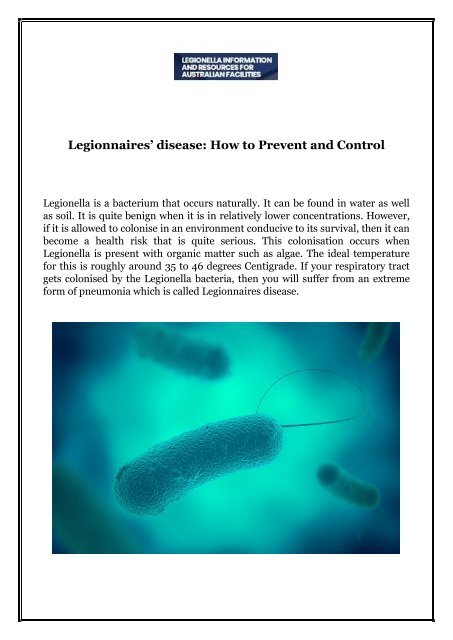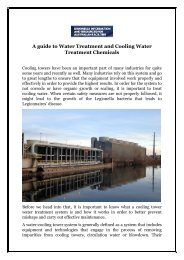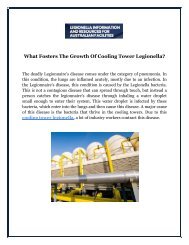Legionnaires’ disease: How to Prevent and Control
Legionella is a bacterium that occurs naturally. It can be found in water as well as soil. It is quite benign when it is in relatively lower concentrations.
Legionella is a bacterium that occurs naturally. It can be found in water as well as soil. It is quite benign when it is in relatively lower concentrations.
Create successful ePaper yourself
Turn your PDF publications into a flip-book with our unique Google optimized e-Paper software.
<strong>Legionnaires’</strong> <strong>disease</strong>: <strong>How</strong> <strong>to</strong> <strong>Prevent</strong> <strong>and</strong> <strong>Control</strong><br />
Legionella is a bacterium that occurs naturally. It can be found in water as well<br />
as soil. It is quite benign when it is in relatively lower concentrations. <strong>How</strong>ever,<br />
if it is allowed <strong>to</strong> colonise in an environment conducive <strong>to</strong> its survival, then it can<br />
become a health risk that is quite serious. This colonisation occurs when<br />
Legionella is present with organic matter such as algae. The ideal temperature<br />
for this is roughly around 35 <strong>to</strong> 46 degrees Centigrade. If your respira<strong>to</strong>ry tract<br />
gets colonised by the Legionella bacteria, then you will suffer from an extreme<br />
form of pneumonia which is called Legionnaires <strong>disease</strong>.
This <strong>disease</strong> can be contracted through aspiration, which is when water particles<br />
that are contaminated with the bacteria are taken in<strong>to</strong> the lungs. This happens<br />
when a person chokes while drinking, swallowing or ingesting. It can also be<br />
contracted by breathing in the water aerosols that contain legionella. When a<br />
person is infected, they generally have symp<strong>to</strong>ms that are characteristic of flu,<br />
such as muscle pain, headaches, followed by chills, dry cough, vomiting, high<br />
fevers, diarrhoea, nausea, chest pains as well as difficulty in breathing.<br />
People above the age of 50, who contract legionaries’ <strong>disease</strong>, are at risk in<br />
particular. The <strong>disease</strong> has a mortality rate of 30%. People who have a his<strong>to</strong>ry of<br />
respira<strong>to</strong>ry <strong>disease</strong>s or lung <strong>disease</strong>s, people who are diabetic, heavy smokers<br />
<strong>and</strong> drinkers, <strong>and</strong> also people who have weak immune systems are at a higher<br />
risk than others. Cooling <strong>to</strong>wers happen <strong>to</strong> be very good legionella breeding<br />
grounds. The bacteria can colonise easily. Thus, such areas are regularly noted <strong>to</strong><br />
be the crux of the issue when there is an outbreak of Legionnaire’s <strong>disease</strong>.<br />
In order <strong>to</strong> prevent these outbreaks, some precautions have <strong>to</strong> be taken. Having<br />
legionella information helps a lot as well. One can check out Legionella<br />
Regulations website set up by HydroChem, one of the leading companies<br />
providing industrial <strong>and</strong> commercial water treatment in Australia, for guidance.<br />
Outbreaks typically occur during the warm seasons because the perfect<br />
conditions for the bacteria <strong>to</strong> thrive require warm water system. There has been<br />
advancement in the methods of detecting the bacteria; however, this doesn’t do<br />
much <strong>to</strong> reduce the infections. It is extremely important <strong>to</strong> ensure that water<br />
systems are well maintained <strong>and</strong> are in a healthy condition. This is the most<br />
effective way <strong>to</strong> curb the risks of Legionella colonisation. Moreover, you must<br />
make sure that the latest steps are taken when installing a cooling <strong>to</strong>wer. It must<br />
be registered, tested <strong>and</strong> maintained regularly. Research has shown that doing<br />
this significantly reduces the risk of an outbreak. For more detaila, visit<br />
http://www.legionellaguidelines.com.au/legionella/





